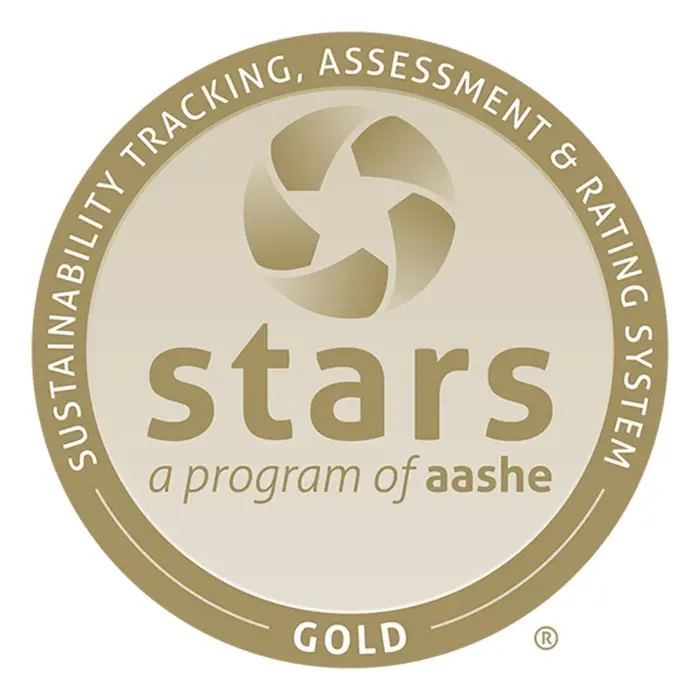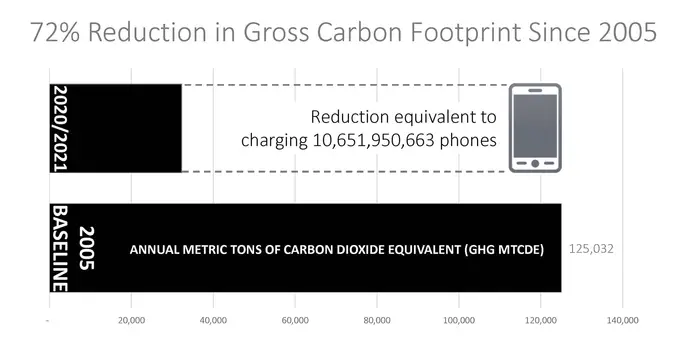
CMU Earns Gold Rating for Commitment to Green Practices, Sustainability
Media Inquiries
Carnegie Mellon University has earned gold for being green.
The university recently was awarded its second consecutive gold ranking by the Association for the Advancement of Sustainability in Higher Education (AASHE) for its sustainability performance in five categories: �Academics, Engagement, Operations, Planning and Administration, and Innovation and Leadership. AASHE’s Sustainability Tracking, Assessment and Rating System (STARS) uses a self-reporting structure for colleges and universities to measure their environmental efforts.
Carnegie Mellon’s latest report, which got underway last March, was compiled by more than 50 individuals representing 23 departments across the university, from the Provost’s Office and the Steinbrenner Institute for Environmental Education and Research, to Facilities Management and Campus Services and the Office of Human Resources.
“In Carnegie Mellon’s mission to transform society, our actions on campus must reflect our ambitions to impact the world,” said President Farnam Jahanian. “Our university’s participation in STARS is a great example of our community’s shared responsibility and accountability in creating a more sustainable planet, and strengthens the campus-wide partnerships necessary to maintain sustainability-focused programs.”
Carnegie Mellon earned a silver rating in 2015 and its first gold award in 2019.
Deborah Steinberg, CMU’s new manager for green practices and sustainability, coordinated the university’s report for 2022 soon after joining CMU in July 2021 from Knox College, where she was director of Sustainability Initiatives. Steinberg is working with FMCS to provide vision and leadership to advance sustainability efforts across all aspects of university support services. She earned her master’s degree in landscape architecture from Chatham University, a master’s degree in education from the University of Illinois at Chicago, and a bachelor’s degree in resource ecology and management from the University of Michigan.
Steinberg said the university’s report scored the highest in the academics and engagement categories with more than 48% of CMU undergraduate and graduate course offerings mapping to at least two of the 17 Sustainability Development Goals. She said in 2021, CMU’s greenhouse gas emissions inventory showed a 72% reduction in emissions since the inaugural inventory in 2005.
“The greenhouse gas emission inventory was a good summary of CMU’s operational sustainability initiatives,” Steinberg said. “It looks at purchased and generated energy, and reflects our Renewable Energy Credits and increased building efficiency as seen through our commitment to LEED certification for significant renovations and new construction.”
Related Content
- The Sustainability Initiative at CMU (opens in new window)
- Carnegie Mellon’s 2021 STARS Report (opens in new window)
- EPA Names CMU One of Top 30 Green Power Universities (opens in new window)
- Environment at CMU (opens in new window)
- A Partnership for the Goals (opens in new window)
- CMU Completes Voluntary Review of Sustainable Development Goals (opens in new window)
- Hiniker Commits to Connecting CMU with Global Goals (opens in new window)
- CMU Initiative Aims at the Sustainable Development Goals (opens in new window)
- Student Researchers Work to Advance Sustainable Development (opens in new window)
- Guenther Works to Grow a Greener CMU (opens in new window)
For the past decade, Carnegie Mellon has purchased all of it electricity from renewable sources, such as wind, solar, geothermal, biogas, biomass and low-impact hydro. This past fall, the university was ranked 11th in the EPA’s list of Top 30 Green Power Universities. Twenty-four of CMU’s buildings have earned either gold or silver LEED certification for their energy efficiency and environmental design.
Steinberg also noted the often-overlooked efforts to reduce emissions, including zero-waste efforts and the use of alternative transportation on campus, such as biking and walking. CMU is recognized as a bicycle-friendly university by the League of American Bicyclists.
A point of distinction in the report that Steinberg said garnered “innovation points,” was CMU’s Voluntary University Review. The VUR, a first-of-its-kind report released by Provost Jim Garrett at the United Nations General Assembly in September 2020, reviewed the university’s education, research and practices to develop a snapshot of activities related to the 17 Sustainability Development Goals (SDGs).
CMU ranked 11th in the EPA’s list of Top 30 Green Power Universities.
“We know that universities offer an important and stable platform from which to advance these global goals,” Garrett recently shared at the INTERSECT@CMU Conference. “Through the process of developing a VUR, we have identified many ways that our students, faculty and staff are making great contributions to the SDGs. At CMU, we are intently focused on our shared responsibility to not only educate the future leaders of our world but to help save the planet on which they live.”�
The Scott Institute for Energy Innovation offers seed grants to faculty for energy research and supports the development of new research in areas such as energy sources, production, efficiency and environmental impacts. In 2020, the institute awarded almost half a million dollars to nine faculty-led projects.
The Steinbrenner Institute encourages student sustainability research through a variety of programs, at both the undergraduate and graduate levels. Undergraduate research is supported by engaging students in campus greening projects that relate to their academic work and research, and through the Steinbrenner Institute SEED grant program.
Steinberg encourages members of the campus community to view CMU’s STARS report on the AASHE’s website.
“The report is an excellent way to review all of CMU’s sustainability efforts across campus,” Steinberg said. “We want students, faculty and staff to read the report and contact us with any feedback or suggestions. It’s a valuable resource for anyone interested in campus sustainability initiatives and research.”

